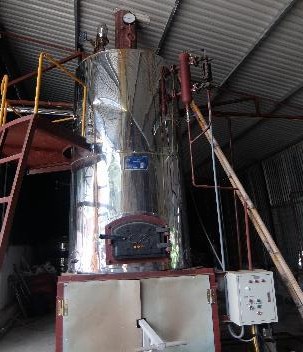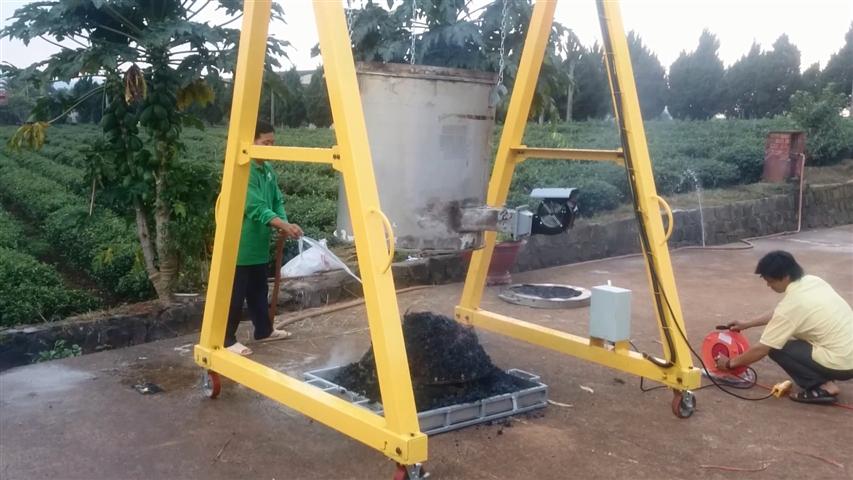Industrial biomass gasification
With increasing competition, fossil fuel costs are becoming a burden for businesses and the community. Meanwhile in Vietnam, there are up to 120 million tons of biomass are generated from agriculture and forestry activities annually. Biomass presents everywhere, with a density of 50 to 500 tons / km2 per year. Unfortunately, despite the low cost and wide availability, biomass is still only burned directly, leading to many obstacles: pollution, reduced thermal equipment lifespan, and extremely low efficiency. These drawbacks limit the popularity of biomass as a cheap, clean and renewable source of energy. According to statistics from the Ministry of Industry and Trade and the Danish International Development Agency (DANIDA) in 2016, only 11 million tons of biomass were utilized, while the rest was burned openly or wasted. For example, the practice of burning straw and crop residues after harvest causes serious air pollution in many provinces throughout the country.
This reality poses an urgent need for technical solutions to efficiently utilize biomass fuels. Among potential candidates such as biofuels, biogas... biomass gasification is considered as a simple and highly practical solution.
Since 2010 CCS team has studied biomass gasification technology. Throughout 9 years of efforts, dozens of generations of gasifier equipment has been developed, targeting many applications from industrial boilers, industrial heat-exchanger, biochar makers to household gasifiers for urban, rural and mountainous residences.
 Batch biomass gasifier for medium heat-exchanger - 2016
Batch biomass gasifier for medium heat-exchanger - 2016
 Biomass gasifier equipment for boiler - 2016
Biomass gasifier equipment for boiler - 2016
All of these generations apply full gasification technology and perform well mixing of syngas with secondary gas before burning, to ensure complete combustion and minimize emissions. A number of typical generations have been sent to laboratories of Delft University of Technology, the Netherlands; Southeast Asia laboratories of the Netherlands Development Organization (SNV); and Hanoi University of Technology to monitor their performance and emissions. The results show that the equipment efficiency is very high, for example: household gasifiers efficiencies of 45% to 67% (clearly higher compared to other types of household cook stoves), while an industrial boiler without a heater and heat recovery system already reaching 76% efficiency. Meanwhile, CO and PM2.5 emissions are 10 times lower than the Vietnamese standard.
Specifically, since 2017, CCS has successfully developed continuous biomass gasification equipment with a lower production cost than intermittent gasification (batch burning). This is a radical solution for the inherent limitations of biomass gasification technology: continuous equipment with high performance, easy to operate but too expensive and cumbersome; while batch device is compact, low cost but difficult to operate, low performance and cannot run continuously. In addition, continuous gasifier has additional advantages: better syngas quality thanks to increased content of H2 and CH4, lower requirements on the formality and moisture content of fuel, biochar activated with steam thus possessing higher quality, more durable equipment.
Continuous biomass gasification equipment has been tested for small boilers, small scale tea producers, and also for food serive businesses.
 Continuous biomass gasifier for small scale tea producers - 2019, piloted and applied in Thai Nguyen province
Continuous biomass gasifier for small scale tea producers - 2019, piloted and applied in Thai Nguyen province
The economic benefits of biomass fuel when applying biomass gasification technology compared to other fossil fuels are shown in the following table:
Table: Energy costs of CBGT versus coal, diesel oil and liquified petroleum gas (LPG)
|
|
Calorific value (kCal/kg) |
Efficiency, % |
Input equivalent for same calorific value (kg) |
Price (EUR/kg) |
Energy costs (EUR)**** |
|
Biomass |
4,200* |
80 |
1** |
0.057*** |
0.057 |
|
Coal |
7,000 |
65 |
0.74 |
0.17 |
0.12 |
|
Diesel oil |
10,700 |
75 |
0.42 |
0.77 |
0.32 |
|
LPG |
12,500 |
80 |
0.336 |
0.92 |
0.30 |
*4200 kCal/kg is a conservative value; **1 kg biomass set as reference point (equal to 80% x 4,200=3,360 kCal); ***Production cost of pre-processed biomass is EUR 0.04/kg and assumed commercial price is EURO 0.18/kg; ****Energy costs of 1 kg biomass compared to coal, diesel oil and LPG to reach equivalent caloric value (heat).
In addition, biochar, a by-product of gasification, is also a valuable resource. The gasification process retains the geometric structure of the material as it was before burning (rice husks, coffee beans, etc.). Biochar helps preserve nutrients to improve soil quality, enabling the soil to become more porous and thereby reducing the amount of chemical fertilizer needed. Besides, due to containing 20% carbon, the application of biochar to soil also contributes to the process of carbon burial, which is an effective solution because carbon is buried underground instead of discharging into the atmosphere.















